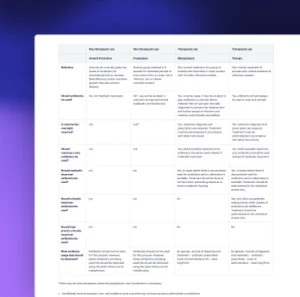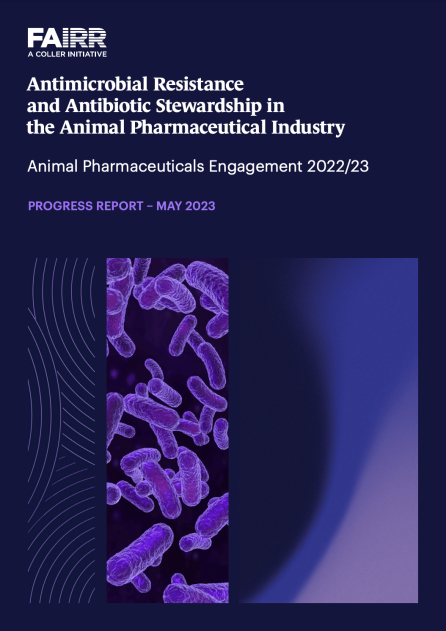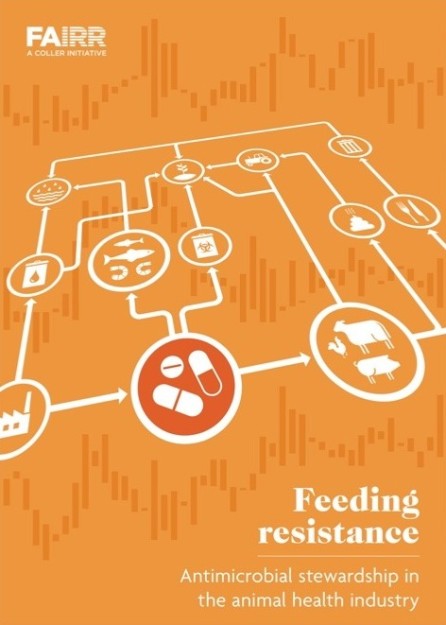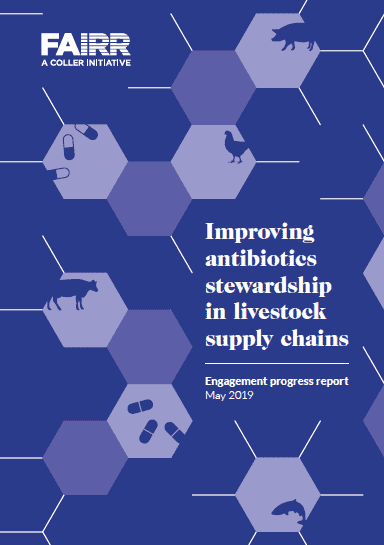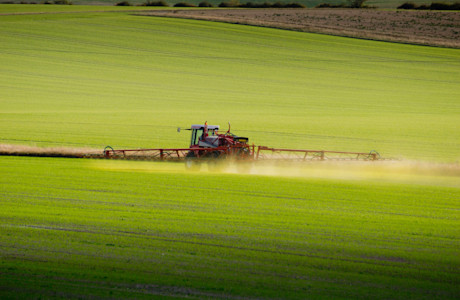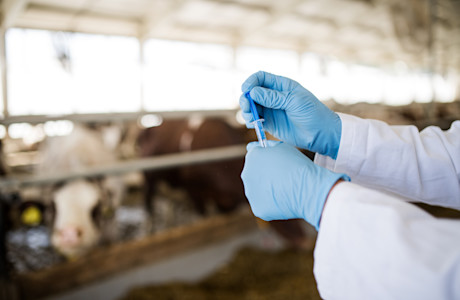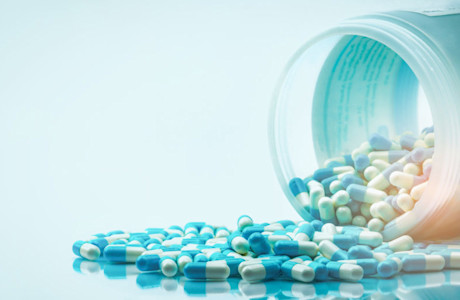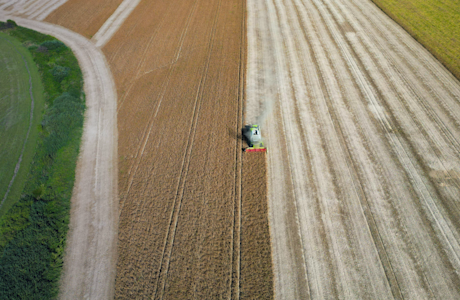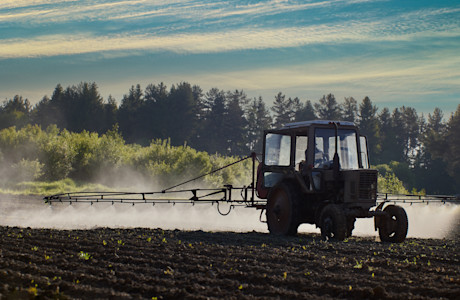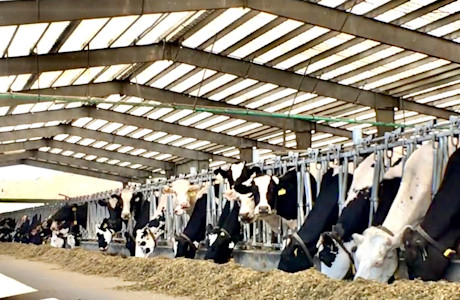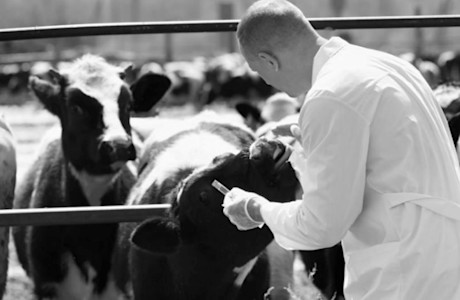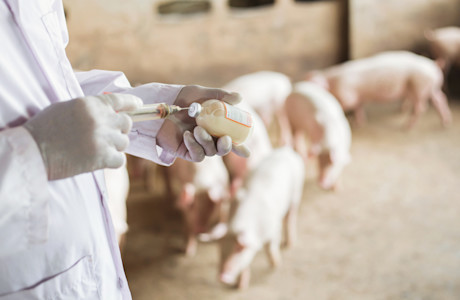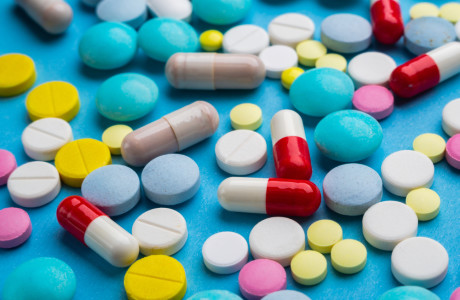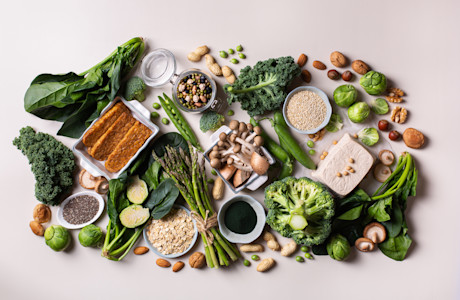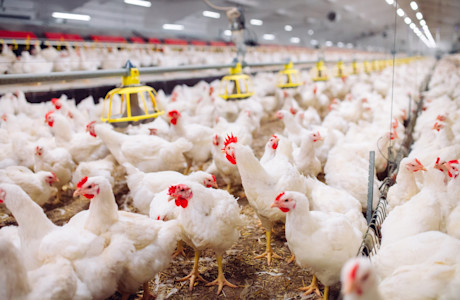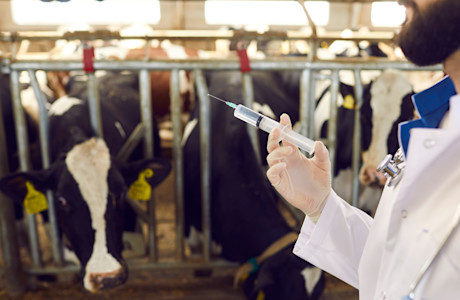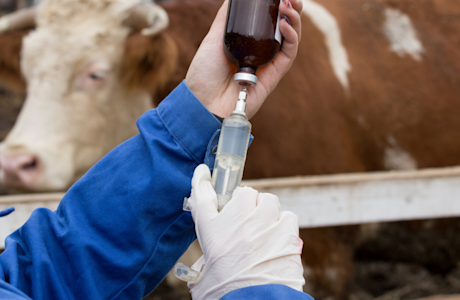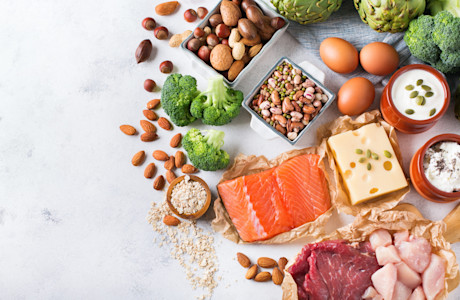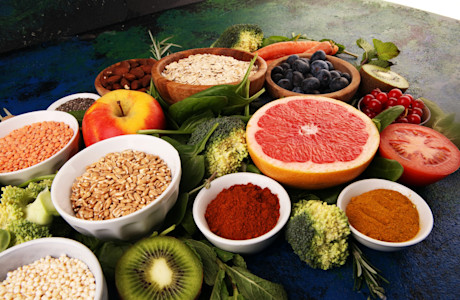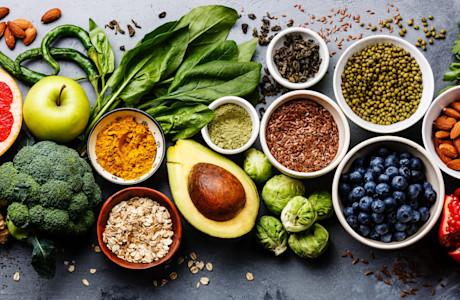
Antibiotics & Health
Antibiotics & Health Overview
Antimicrobial resistance (AMR) has been termed the ‘silent pandemic’ as it makes it more difficult and even impossible to treat bacterial infections. In 2019, the World Health Organisation (WHO) declared AMR one of the top 10 global health threats facing humanity.
It is recognised not only as a global threat to public health, but also to economic prosperity, as the global economic costs associated with AMR are likely to be $100 trillion and lead to a long-term 3.8% decrease in GDP by 2050.
Reliance on the routine use of antibiotics in factory farming for growth promotion and prophylaxis has resulted in animal agriculture accounting for an estimated 70% of antibiotic consumption globally. The industry is consequently a significant contributor to AMR globally, with this expected to rise as more countries embrace intensive farming systems to meet the growing demand for meat, dairy and fish. It is projected that by 2030, antibiotic consumption in farm animals will increase by 67%.
As a result, FAIRR efforts seek to encourage responsible use of antibiotics in line with WHO guidelines through company engagement across the animal protein supply chain and multilateral stakeholder engagement on the issue to encourage policy change in key producing regions.
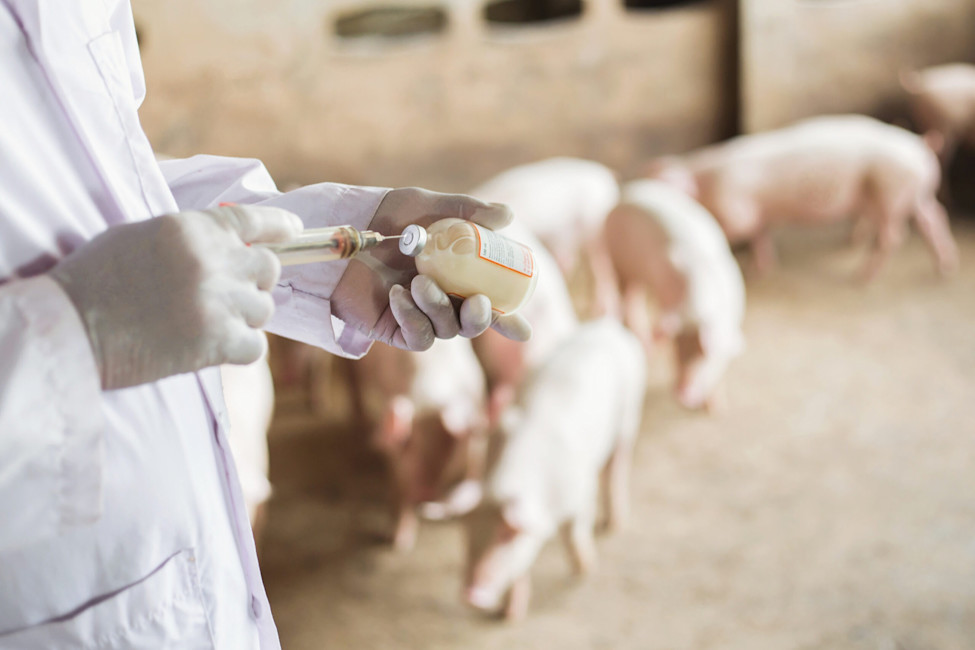
Latest Activity
Guide Launch: Health and Wealth: The Investors’ Guide to Antimicrobial Resistance
Antimicrobial resistance (AMR) is recognised by investors as a risk to global health and economic stability.
Co-developed by MSCI Sustainability Institute, IAAMR and FAIRR, the guide explores strategies that investors can implement to address AMR. It provides an analysis of the economic impacts, risks and opportunities associated with AMR as well as case studies demonstrating how investors are taking action.
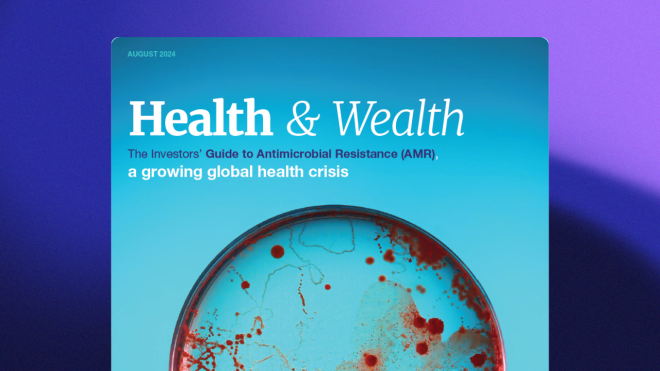
Research Launch: Protein & Nutrition: Research overview
This research overview provides key scientific insights into the environmental and social impacts of different protein sources, clarifies common assumptions about their health effects, and identifies trends, risks and opportunities for investors with exposure to the protein supply chain.
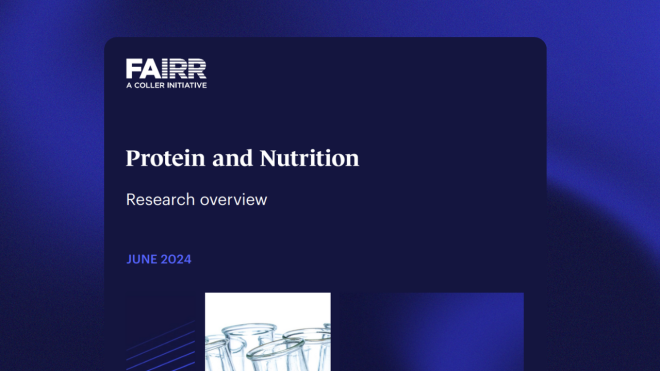
Report Launch: From Farms to Forks: Antibiotic Stewardship
In May 2023, FAIRR launched two engagements; Animal Pharmaceuticals (Phase 2) and Restaurant Antibiotics (Phase 1). The engagements aim to improve transparency around how companies operating at different stages of the protein value chain are working to ensure responsible antibiotic use at the farm level.
The report highlights key findings, provides company-specific examples, and explains how companies could improve disclosure to demonstrate that they are addressing the systemic risk of AMR.
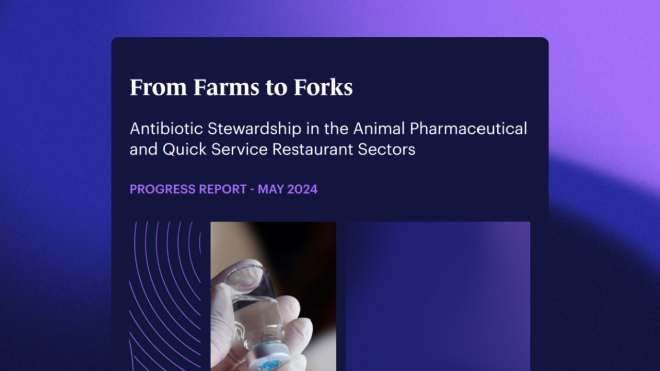
Sign-on Open: IAAMR launches a new public investor statement
The IAAMR statement is open for sign-on which highlights investor concerns regarding antimicrobial resistance as a systemic risk to investment portfolios, economic stability and to broader society. The statement outlines seven key asks of global policymakers to consider ahead of the UN General Assembly High-Level Meeting on AMR on 26 September.
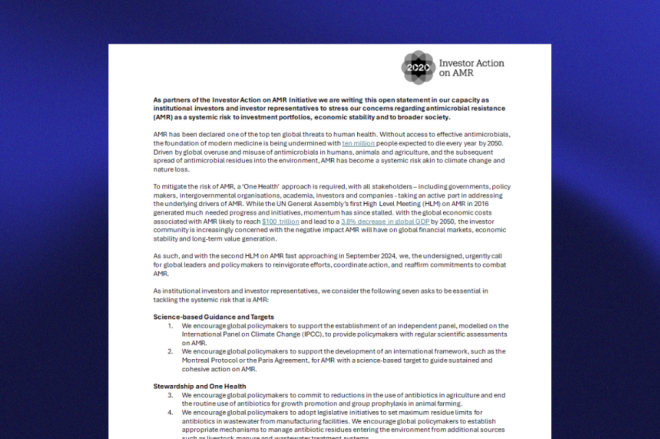
Factsheet Launch: Investor guide to antibiotics in animal agriculture: Protein-specific antibiotics factsheets
Antibiotic use in animal agriculture varies widely by factors such as species, geography, and farm type. FAIRR has published species-specific factsheets that look at antibiotic use in intensive livestock farming to provide investors with an informative and easily digestible insight into variations in antibiotic use across species. Additionally, FAIRR has also published sector-specific questions on antibiotics and AMR to support investors when engaging companies on this topic.
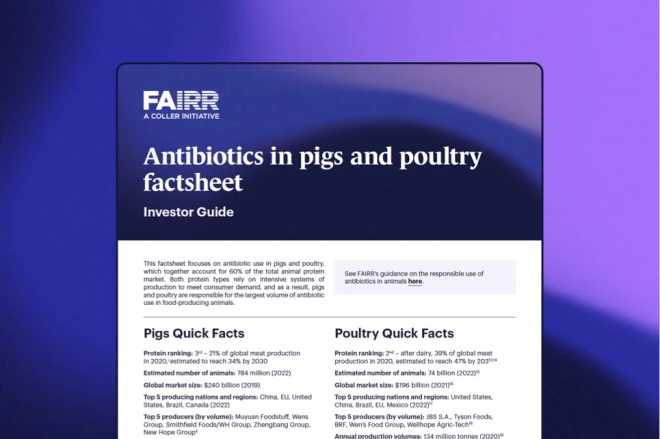
Report Launch: Antimicrobial Resistance & Antibiotic Stewardship in the Animal Pharmaceutical Industry
In May 2022, FAIRR launched a collaborative investor engagement focused on 7 global publicly-listed animal pharmaceutical companies and is supported by 65 investors representing over $17 trillion in combined assets. The aim is to drive greater disclosure and clarity over how – and if – animal pharmaceutical companies are addressing the risk of AMR throughout their value chains, from factory to farm.
To view the progress achieved in the last year, download our latest report which discusses company efforts across manufacturing, labelling, marketing and sales practices.
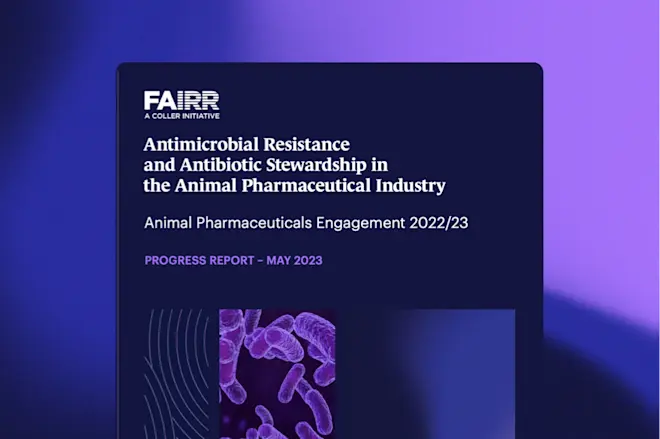
Restaurant Antibiotics Engagement
The objective of this engagement is to facilitate communication between investors and the quick-service restaurant sector to improve disclosure around how companies are mitigating antimicrobial resistance (AMR) risk in their animal protein supply chains. This engagement will ask companies to (i) demonstrate sufficient rigour and scope of existing policies, (ii) develop antibiotic policies to cover all key proteins, (iii) provide evidence of implementation through target setting and auditing.
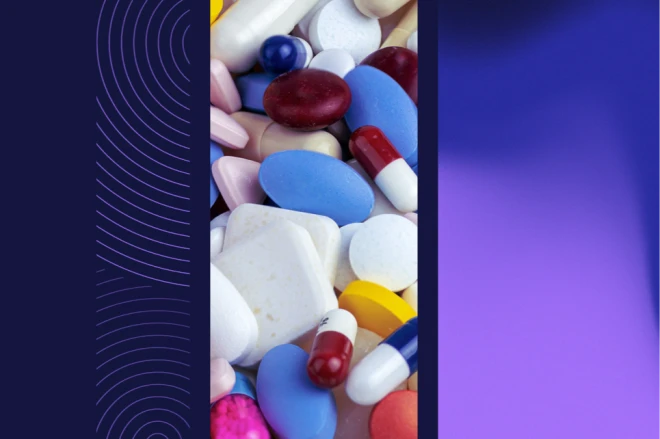
Animal Pharmaceuticals Engagement
The objective of this engagement is to facilitate communication between investors and the animal pharmaceutical sector and drive greater disclosure and clarity over how – and if – animal pharmaceutical companies are addressing the risk of AMR throughout their value chain, from factory to farm. It also seeks to explore some of the key actions the companies must take to future-proof the long-term sustainability of their antibiotic portfolios, capitalise on the growing demand for alternatives to antibiotics, and reduce the spread of AMR.
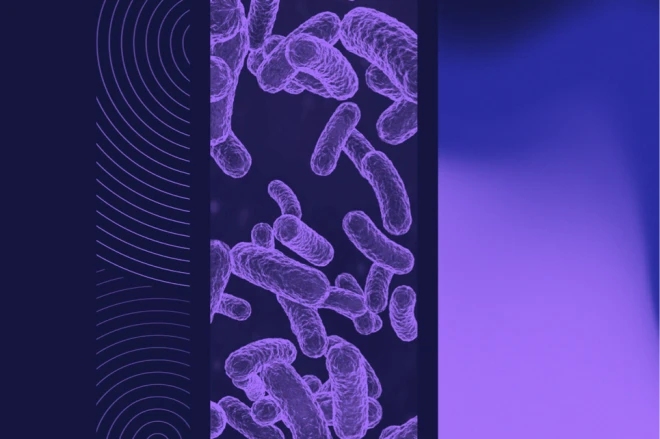
Guide Launch: Health and Wealth: The Investors’ Guide to Antimicrobial Resistance
Antimicrobial resistance (AMR) is recognised by investors as a risk to global health and economic stability.
Co-developed by MSCI Sustainability Institute, IAAMR and FAIRR, the guide explores strategies that investors can implement to address AMR. It provides an analysis of the economic impacts, risks and opportunities associated with AMR as well as case studies demonstrating how investors are taking action.
Research Launch: Protein & Nutrition: Research overview
This research overview provides key scientific insights into the environmental and social impacts of different protein sources, clarifies common assumptions about their health effects, and identifies trends, risks and opportunities for investors with exposure to the protein supply chain.
Report Launch: From Farms to Forks: Antibiotic Stewardship
In May 2023, FAIRR launched two engagements; Animal Pharmaceuticals (Phase 2) and Restaurant Antibiotics (Phase 1). The engagements aim to improve transparency around how companies operating at different stages of the protein value chain are working to ensure responsible antibiotic use at the farm level.
The report highlights key findings, provides company-specific examples, and explains how companies could improve disclosure to demonstrate that they are addressing the systemic risk of AMR.
Sign-on Open: IAAMR launches a new public investor statement
The IAAMR statement is open for sign-on which highlights investor concerns regarding antimicrobial resistance as a systemic risk to investment portfolios, economic stability and to broader society. The statement outlines seven key asks of global policymakers to consider ahead of the UN General Assembly High-Level Meeting on AMR on 26 September.
Factsheet Launch: Investor guide to antibiotics in animal agriculture: Protein-specific antibiotics factsheets
Antibiotic use in animal agriculture varies widely by factors such as species, geography, and farm type. FAIRR has published species-specific factsheets that look at antibiotic use in intensive livestock farming to provide investors with an informative and easily digestible insight into variations in antibiotic use across species. Additionally, FAIRR has also published sector-specific questions on antibiotics and AMR to support investors when engaging companies on this topic.
Report Launch: Antimicrobial Resistance & Antibiotic Stewardship in the Animal Pharmaceutical Industry
In May 2022, FAIRR launched a collaborative investor engagement focused on 7 global publicly-listed animal pharmaceutical companies and is supported by 65 investors representing over $17 trillion in combined assets. The aim is to drive greater disclosure and clarity over how – and if – animal pharmaceutical companies are addressing the risk of AMR throughout their value chains, from factory to farm.
To view the progress achieved in the last year, download our latest report which discusses company efforts across manufacturing, labelling, marketing and sales practices.
Restaurant Antibiotics Engagement
The objective of this engagement is to facilitate communication between investors and the quick-service restaurant sector to improve disclosure around how companies are mitigating antimicrobial resistance (AMR) risk in their animal protein supply chains. This engagement will ask companies to (i) demonstrate sufficient rigour and scope of existing policies, (ii) develop antibiotic policies to cover all key proteins, (iii) provide evidence of implementation through target setting and auditing.
Animal Pharmaceuticals Engagement
The objective of this engagement is to facilitate communication between investors and the animal pharmaceutical sector and drive greater disclosure and clarity over how – and if – animal pharmaceutical companies are addressing the risk of AMR throughout their value chain, from factory to farm. It also seeks to explore some of the key actions the companies must take to future-proof the long-term sustainability of their antibiotic portfolios, capitalise on the growing demand for alternatives to antibiotics, and reduce the spread of AMR.
Animal Pharmaceuticals Engagement
This engagement tackles the lack of transparency from animal pharmaceutical companies over how they manufacture, market, and sell antibiotics – practices that could contribute to AMR hotspots in the environment and drive high levels of antibiotic use.
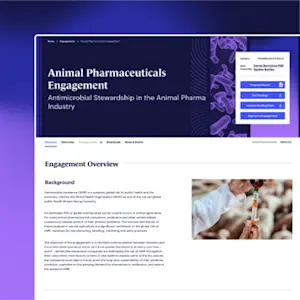
Restaurant Antibiotics Engagement
This engagement addresses the quick-service restaurant sector on the need to improve antibiotic stewardship practices.

FAIRR view: Responsible antibiotic use in animal agriculture
The responsible use of antibiotics in animal supply chains plays an integral role in preserving efficacy of antibiotics and preventing the spread of AMR.
